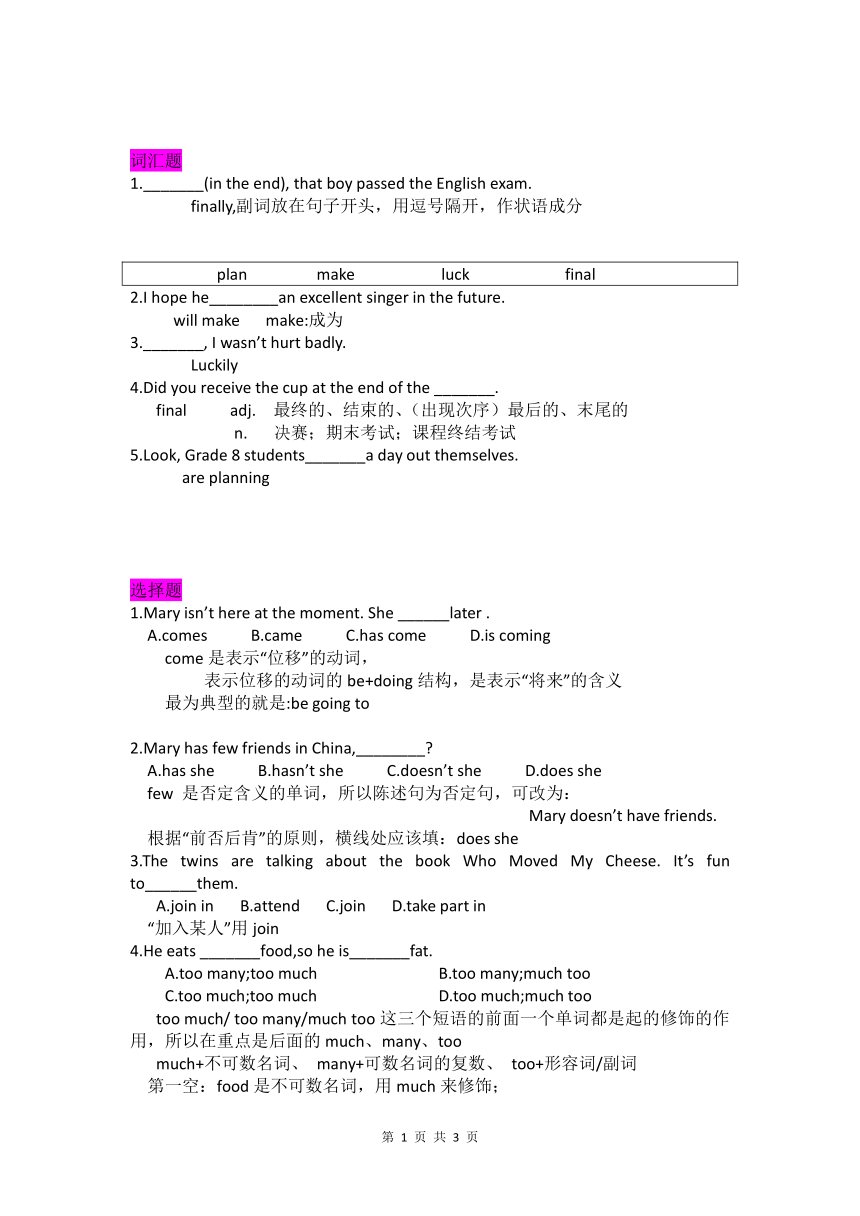八年级上册Unit 3 A day out易错题(含解析)
文档属性
| 名称 | 八年级上册Unit 3 A day out易错题(含解析) |

|
|
| 格式 | zip | ||
| 文件大小 | 38.0KB | ||
| 资源类型 | 教案 | ||
| 版本资源 | 牛津译林版 | ||
| 科目 | 英语 | ||
| 更新时间 | 2021-11-25 00:00:00 | ||
图片预览

文档简介
词汇题
1._______(in the end), that boy passed the English exam.
finally,副词放在句子开头,用逗号隔开,作状语成分
plan make luck final
2.I hope he________an excellent singer in the future.
will make make:成为
3._______, I wasn’t hurt badly.
Luckily
4.Did you receive the cup at the end of the _______.
final adj. 最终的、结束的、(出现次序)最后的、末尾的
n. 决赛;期末考试;课程终结考试
5.Look, Grade 8 students_______a day out themselves.
are planning
选择题
1.Mary isn’t here at the moment. She ______later .
A.comes B.came C.has come D.is coming
come是表示“位移”的动词,
表示位移的动词的be+doing结构,是表示“将来”的含义
最为典型的就是:be going to
2.Mary has few friends in China,________
A.has she B.hasn’t she C.doesn’t she D.does she
few 是否定含义的单词,所以陈述句为否定句,可改为:
Mary doesn’t have friends.
根据“前否后肯”的原则,横线处应该填:does she
3.The twins are talking about the book Who Moved My Cheese. It’s fun to______them.
A.join in B.attend C.join D.take part in
“加入某人”用join
4.He eats _______food,so he is_______fat.
A.too many;too much B.too many;much too
C.too much;too much D.too much;much too
too much/ too many/much too这三个短语的前面一个单词都是起的修饰的作用,所以在重点是后面的much、many、too
much+不可数名词、 many+可数名词的复数、 too+形容词/副词
第一空:food是不可数名词,用much来修饰;
第二空:fat是形容词,用too来修饰
5.--Our teacher won’t give us the answer to the question.
--Why_____work it out all by_______
A.not;themselves B.not to;himself C.don’t;ourselves D.not;ourselves
Why don’t 后面一定要+主语
Why 后面不加主语时,助动词do/does也要省略
6.I hope Millie_______to my birthday party tonight.
A.can come B.to come C.comes D.coming
Millie是hope引导的宾语从句的主语,主语后面+谓语动词+其他
只有A.C可以作谓语动词,
但是tonight表明事情还没有发生,所以不能用一般现在时,
7.The flowers in Nancy’s room are as beautiful as_______in Suzy’s.
A.they B.the ones C.these D.them
the ones可以用来代指与上文提到的可数名词复数“同类”的可数名词复数
8.Thanks for keeping the secret________me. I’ll keep the secret________myself.
A.to;for B.for;to C.for;with D.at;to
for:为了 to:对
keep a secret for sb. 是为了sb.保守秘密 保守秘密的人和秘密的所有人不
是同一个人
keep a secret to sb. 对某人保守秘密 保守秘密的人和秘密的所有人是
同一个人
9.--Could I ______a book from you
--Sure. And you can_______it for 2 weeks.
A.borrow;lend B.lend;borrow C.keep;lend D.borrow;keep
borrow 是短暂性动词,不可以与“一段时间”连用;
“一段时间”要与“持续性动词”连用;
当与“一段时间”搭配时,要将borrow改成keep(保持、持有)
10.Tim________an hour doing his homework and listening to music________him 10 minutes.
A.costs;spends B.spends;takes C.takes;costs D.spends;takes
cost和 take的主语都是“sth” 但cost指的是“花费金钱”
take指的是“花费时间”
spend的主语是“人”,可以指“花费金钱”,也可以指“花费时间”
11.We can learn _______from TV, but we can’t watch______TV.
A.lots of;too much B.a lot of;too many
C.a lot;too much D.a lot;much too
a lot: 很多
lots of和a lot of 词性为:形容词 修饰名词(作定语)
--->后面一定要+名词
第二空:含义为:看太多量的电视,这个“量”是“不可数”的,
用much来修饰
too much的关键在much上,too是much的修饰词
12.They live 20 kilometers______the school, but they still walk to school every day.
A.away B.far C.far from D.away from
far是“泛指”距离远,不与具体的距离数相搭配;
from:(两地的距离)离
13.We took a boat trip and______the Opera House.
A.pass B.past C.go past D.went past
pass: 动词 经过、通过;沿某方向前进;传递;传球
past:介词 经过、路过;(指钟点)过、晚于,在....之后
14.He put his photos on his home page for everyone________.
A.to look at B.look at C.looking D.to look
前面有看的“对象”---照片,
而look为不及物动词,接宾语时,要+介词at,
to do不定式表目的
15.Where ______the match_______
A.is;take place B.did;take place
C.did;happen D.was;happening
happen是偶然或突然发生;
而take place是非偶然发生(即:发生一定有某种原因或事先的安排)
句式转换
1.The bridge is 60 feet wide.
___________is the bridge How wide
2.The boy is not young. He can dress himself.(合并)
The boy is_______ _______to_______ _______. old enough ;dress himself
“不小了”--说明“年纪足够大了”
3.She was too scared to move any more.(同义句)
She was______scared ______ ______ ________ move any more.
so ;that she couldn’t
too....to....:太.....而不能....,这个句式中的to后面的内容虽然是肯定的表达
方式,但是却为否定含义
so.....that....:如此....以至于......
1._______(in the end), that boy passed the English exam.
finally,副词放在句子开头,用逗号隔开,作状语成分
plan make luck final
2.I hope he________an excellent singer in the future.
will make make:成为
3._______, I wasn’t hurt badly.
Luckily
4.Did you receive the cup at the end of the _______.
final adj. 最终的、结束的、(出现次序)最后的、末尾的
n. 决赛;期末考试;课程终结考试
5.Look, Grade 8 students_______a day out themselves.
are planning
选择题
1.Mary isn’t here at the moment. She ______later .
A.comes B.came C.has come D.is coming
come是表示“位移”的动词,
表示位移的动词的be+doing结构,是表示“将来”的含义
最为典型的就是:be going to
2.Mary has few friends in China,________
A.has she B.hasn’t she C.doesn’t she D.does she
few 是否定含义的单词,所以陈述句为否定句,可改为:
Mary doesn’t have friends.
根据“前否后肯”的原则,横线处应该填:does she
3.The twins are talking about the book Who Moved My Cheese. It’s fun to______them.
A.join in B.attend C.join D.take part in
“加入某人”用join
4.He eats _______food,so he is_______fat.
A.too many;too much B.too many;much too
C.too much;too much D.too much;much too
too much/ too many/much too这三个短语的前面一个单词都是起的修饰的作用,所以在重点是后面的much、many、too
much+不可数名词、 many+可数名词的复数、 too+形容词/副词
第一空:food是不可数名词,用much来修饰;
第二空:fat是形容词,用too来修饰
5.--Our teacher won’t give us the answer to the question.
--Why_____work it out all by_______
A.not;themselves B.not to;himself C.don’t;ourselves D.not;ourselves
Why don’t 后面一定要+主语
Why 后面不加主语时,助动词do/does也要省略
6.I hope Millie_______to my birthday party tonight.
A.can come B.to come C.comes D.coming
Millie是hope引导的宾语从句的主语,主语后面+谓语动词+其他
只有A.C可以作谓语动词,
但是tonight表明事情还没有发生,所以不能用一般现在时,
7.The flowers in Nancy’s room are as beautiful as_______in Suzy’s.
A.they B.the ones C.these D.them
the ones可以用来代指与上文提到的可数名词复数“同类”的可数名词复数
8.Thanks for keeping the secret________me. I’ll keep the secret________myself.
A.to;for B.for;to C.for;with D.at;to
for:为了 to:对
keep a secret for sb. 是为了sb.保守秘密 保守秘密的人和秘密的所有人不
是同一个人
keep a secret to sb. 对某人保守秘密 保守秘密的人和秘密的所有人是
同一个人
9.--Could I ______a book from you
--Sure. And you can_______it for 2 weeks.
A.borrow;lend B.lend;borrow C.keep;lend D.borrow;keep
borrow 是短暂性动词,不可以与“一段时间”连用;
“一段时间”要与“持续性动词”连用;
当与“一段时间”搭配时,要将borrow改成keep(保持、持有)
10.Tim________an hour doing his homework and listening to music________him 10 minutes.
A.costs;spends B.spends;takes C.takes;costs D.spends;takes
cost和 take的主语都是“sth” 但cost指的是“花费金钱”
take指的是“花费时间”
spend的主语是“人”,可以指“花费金钱”,也可以指“花费时间”
11.We can learn _______from TV, but we can’t watch______TV.
A.lots of;too much B.a lot of;too many
C.a lot;too much D.a lot;much too
a lot: 很多
lots of和a lot of 词性为:形容词 修饰名词(作定语)
--->后面一定要+名词
第二空:含义为:看太多量的电视,这个“量”是“不可数”的,
用much来修饰
too much的关键在much上,too是much的修饰词
12.They live 20 kilometers______the school, but they still walk to school every day.
A.away B.far C.far from D.away from
far是“泛指”距离远,不与具体的距离数相搭配;
from:(两地的距离)离
13.We took a boat trip and______the Opera House.
A.pass B.past C.go past D.went past
pass: 动词 经过、通过;沿某方向前进;传递;传球
past:介词 经过、路过;(指钟点)过、晚于,在....之后
14.He put his photos on his home page for everyone________.
A.to look at B.look at C.looking D.to look
前面有看的“对象”---照片,
而look为不及物动词,接宾语时,要+介词at,
to do不定式表目的
15.Where ______the match_______
A.is;take place B.did;take place
C.did;happen D.was;happening
happen是偶然或突然发生;
而take place是非偶然发生(即:发生一定有某种原因或事先的安排)
句式转换
1.The bridge is 60 feet wide.
___________is the bridge How wide
2.The boy is not young. He can dress himself.(合并)
The boy is_______ _______to_______ _______. old enough ;dress himself
“不小了”--说明“年纪足够大了”
3.She was too scared to move any more.(同义句)
She was______scared ______ ______ ________ move any more.
so ;that she couldn’t
too....to....:太.....而不能....,这个句式中的to后面的内容虽然是肯定的表达
方式,但是却为否定含义
so.....that....:如此....以至于......
